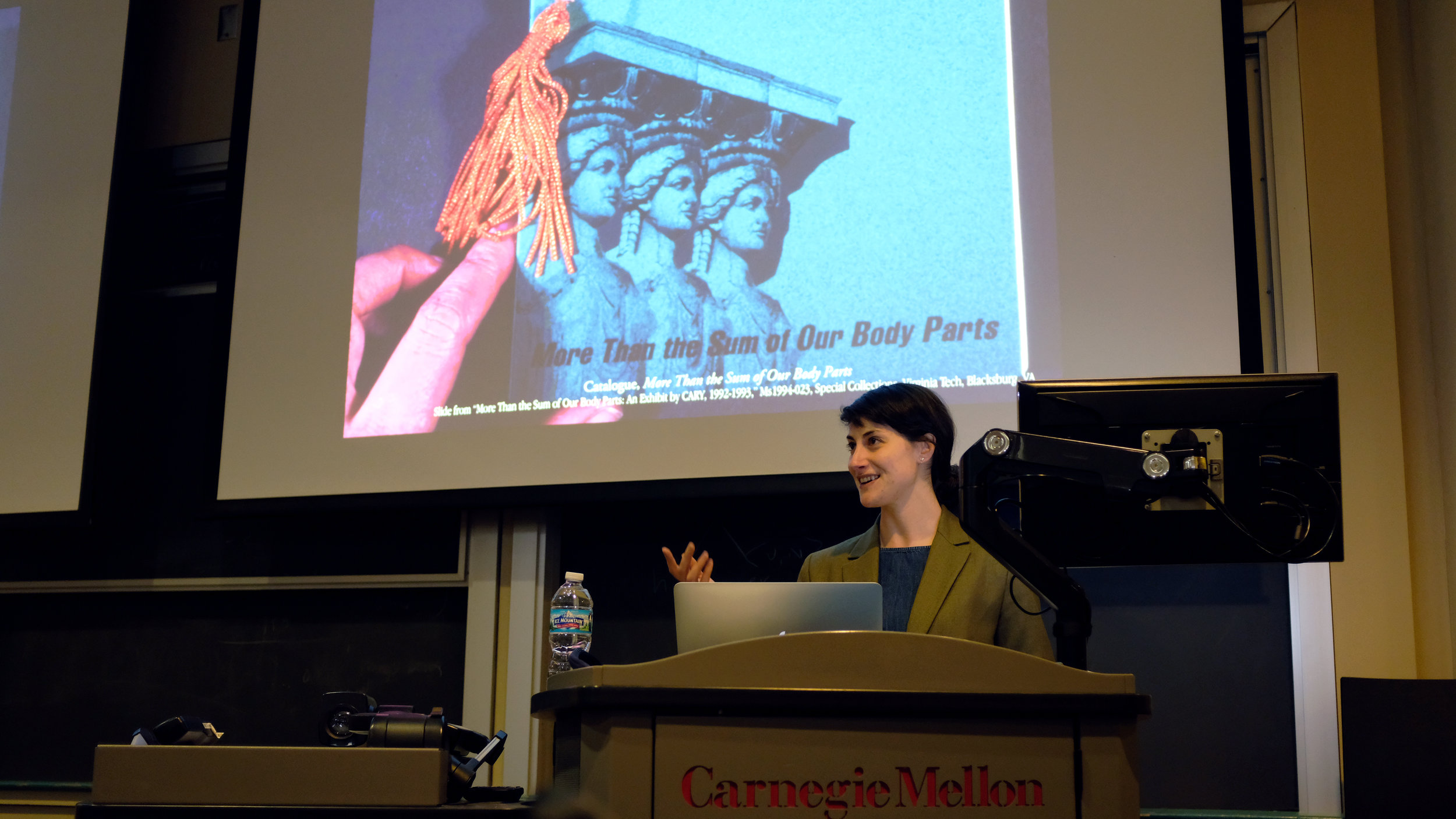Sarah Rafson, 2017-18 Ann Kalla Visiting Professor and founder of Point Line Projects, discussed advocacy and activism with students, faculty, and guests in Margaret Morrison Carnegie Hall on Monday, 2 April 2018. Photo by Christina Brown.
By Bryan Trew
On 2 April, Ann Kalla Visiting Professor Sarah Rafson addressed a full auditorium in Margaret Morrison Carnegie Hall – the building which originally housed the Margaret Morrison Carnegie School for Women – to discuss advocacy and activism in architecture. The sixth lecture of the 2018 SoA Spring Lecture Series explored a two-way street for discourse involving a Q+A with SoA alumna and activist Carol Crandall. Rafson’s message was one that resonated strongly with the audience. The dichotomy of two generations of activism as the focal point of the lecture showed the listeners what the profession can learn about inclusion in architecture from the past and how it might evolve moving into the future.
Rafson studied at the University of Toronto before going on to earn her Master’s degree at Columbia University's Critical, Curatorial and Conceptual Practices in Architecture program. She is the founder of an architectural editorial and curatorial agency called Point Line Projects. Founded in 2016, the organization focuses on providing publication and curatorial services for a diverse set of clients ranging from architects to firms and museums. Point Line’s latest project is an exhibit titled Now What?! Advocacy, Activism & Alliances in American Architecture since 1968, organized in conjunction with ArchiteXX. This exhibition focuses on the history of activism in the architecture community to further the interests of women, LGBTQ, and minority architects.
The bulk of Rafson’s lecture explained the process of curating this exhibition. In tandem with the lecture, Rafson led a more intimate Q+A session with Carol Crandall to involve the audience in the discussion. Crandall is a partner of Crandall Ritzu Architects and a consultant at LCM Architects in Chicago. She is the co-founder of CARYATIDS, a feminist collective of designers in Chicago who curated an exhibit for the 1993 AIA national convention titled “More Than the Sum of Our Body Parts,” which called attention to the struggles of women in the workplace. Audience members at the SoA lecture were curious to learn more about Crandall’s journey as an activist and asked if she had always been interested in activism. Crandall reflected on how she only developed an interest after seeing inequality firsthand upon entering the workforce, and stressed the importance of getting involved early in one’s professional career when there is “nothing to lose.”
Engagement and discussion continued well after the event into the hours and even days following the lecture. Energized by the discourse around activism during the talk, the entire SoA community gathered for a post-lecture reception, where conversation revolved largely around the attendees’ reactions to the still-fresh topic of engaging with activism in their lives. At the Back2Front discussion later that week, Rafson facilitated the conversation and engaged in dialogue focused on the efficacy of advocacy in architectural assembly organizations, such as the AIA and AIAS. Students explored how they might practice more meaningful activism at the university level. The common theme of the conversation throughout the reception and discussion was simple: “Now What?!”
Through Rafson and Crandall, different generations and personalities geared towards activism shared the stage to address issues of the present. Our time has many parallels to the era in which Crandall decided enough was enough and spoke out. Rafson’s exhibition is sure to spark new discourse on the role of advocacy in today’s architectural profession.
Bryan Trew is a first year student in the M.Arch program in the Carnegie Mellon University School of Architecture.

